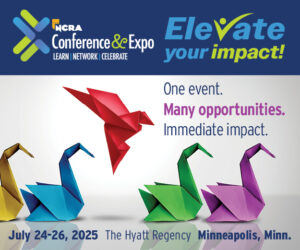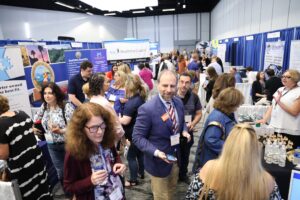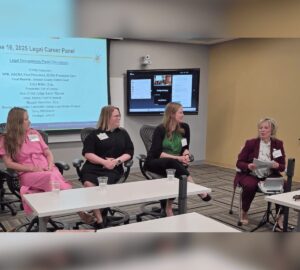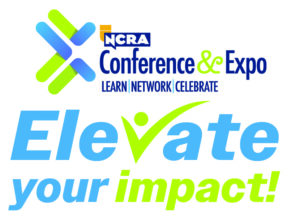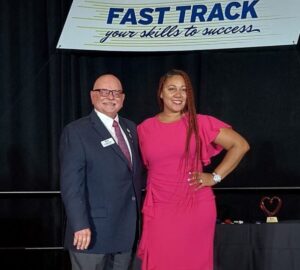 By Allison Kimmel
By Allison Kimmel
Do you remember the day you learned that you passed your RPR certification exam? I distinctly remember when I found out — Christmas Eve. I had taken the test in November of 1989. Every day I would come home from work and ask my husband, Bob, if I had gotten the results. Each time the answer was no. Unbeknownst to me, he had placed the results — unopened — in a wrapped box under the Christmas tree. It could have ended very badly had I not received positive news. He is a very blessed man.
Passing the RPR meant I passed muster and might be able to succeed in court reporting after all. Those credentials represented a lot to me then, and they still do to this day. The other professionals in my national association had given me their imprimatur, and I gleefully joined their ranks as a professional registered member.
Several years have passed since those early days, and I know that I would not be where I am today without the help of mentors and reporters sharing their experiences along the way. Those mentors and reporters began giving advice and encouragement from day one, and it has not stopped. I am lucky to have been surrounded by such a fantastic group of dedicated professionals.
We all have anecdotes of the valuable knowledge that others have passed along to us. To illustrate one such story and the long-term impact of a simple act, when I was a newly graduated reporter in 1987, Jean Long, RPR, graciously shared with me a medical term. She had spent some time looking for the proper spelling at one point in her career; the term was bruit. It is pronounced BREW-EE. She walked me over to the dictionary to point it out. I never forgot her short one-minute lesson.
A couple of years later, at a different court reporting agency, another reporter was struggling to find that exact word. I knew it immediately — not from school days, but from Jean’s lesson. It was time to pay it forward, and I proudly did.
After gaining some real-life experience and much-needed confidence, I came to the realization that it was not enough to be a contented dues-paying member in my professional associations. I wanted to do more. I had observed others volunteering and felt that I could offer perhaps a slightly different approach. It was time — time to repay all those gifts of knowledge and information that were so readily shared with me. I had received so many over the years.
I started out small. Volunteering was out of my comfort zone, and I truly wanted to be brave and emulate some of the best professionals in our business. The first time I volunteered for my state association was in 2002. We had a need to represent the court reporting profession at the All-Ohio High School Counselors Conference in Columbus. With another reporter, Lori Jay, RPR, CMRS, we were responsible for promoting the court reporting and captioning career choices to the school counselors who approached our table of brochures and equipment. Donna Karoscik, RDR, CRR, CRC, provided a demonstration of realtime to the group by captioning the keynote speaker. We were enthusiastic, and we worked hard that day to advocate for our profession.
After that experience, I began helping my state association with administering the national certification exams, first as someone to assist and then as a chief examiner for the CRR tests. I tried to be the voice of calm for test candidates, and I enjoyed seeing the test candidates succeed. I also began assisting my state association at the Ohio Judicial Conference’s Court Technology Conference. With many vendors present touting their “technology,” it was an eye-opening experience. I now know just how crucial it is for court reporting associations to be represented at such events — and displaying the best we have to offer in court reporting and realtime technology. My state association members attend this event year after year without fail.
Fast forward a few years. Our state association needed members willing to serve on the board. After some persuasive discussion by Sue Terry, FAPR, RPR, CRR, CRC, and a multitude of excuses on my end, I agreed to serve on the Board of Directors of the Ohio Court Reporters Association (OCRA). I came in as vice president and moved my way up the ladder. It was at that point that I began to understand the intricacies of leading, the minefields — some of which cannot be avoided — and the heavy lifting that volunteering involved. My prior volunteer experiences were rewarding but nowhere near as challenging. The successes were amazing; the failures devastating.
I was working as an official court reporter in state court during this time. My court administration seemed enamored with digital recording technology and eagerly proclaimed the cost savings to be realized to any who would listen. It appeared to be an uphill and frustrating battle.
Through the efforts of the late Jerry Kelley and other volunteers across the country, I quietly began to amass a database of current electronic and digital recording failures. It was an informal, unsanctioned effort, but the group saw a need. The database effort seemed a tad futile at times, but I can attest that the information gathered was useful at a key moment during my tenure on the OCRA board, particularly when the Cleveland Plain Dealer came calling for commentary on an article regarding the court reporter versus electronic and digital recording debate. That volunteer effort provided relevant, documented cases to cite, not just hearsay or conjecture. It was a small victory.
Coincidentally, it was around this point that Stephen Zinone, RPR, reached out to me about serving on the NCRA Cost Comparison Task Force. Our task was to do a complete analysis of the cost of digital recording technology versus a court reporter — using best practices for each. To say this was right up my alley is an understatement. Steve was a thoughtful, smart leader who asked for input from all of us. The entire group worked hard to make the Task Force’s white paper bulletproof. We accomplished our goal, though it took many emails, conference calls, an in-person meeting in Nashville, and a couple of years of persistence. To this day, when OCRA members attend the Ohio Judicial Conference’s Court Technology Conference, we have the white paper there to discuss with attendees.
That first experience serving as a task force volunteer at the national level gave me a huge sense of fulfillment. I was proud of our work, and I was hooked. I knew I could make a difference — if not for myself, perhaps for others.
Working with students as an adjunct faculty member for Clark State Community College is something I enjoy immensely, so signing up to work on the Item Writing Committee seemed a natural fit. Brenda Fauber, FAPR, RDR, CRR, CPE, served as the chairperson of the committee. The group met in the Washington, D.C., area. We spent time training with a professional consultant, and we discussed at length what is involved in writing proper written knowledge test questions using approved authoritative sources. (Yes, there is a question involving bruit — in case you were wondering. I’m paying it forward.) I continue to serve on the committee; along the way, I have begun serving on the Skills Test Writing Committee.
What an education I have received! I have gained a deeper appreciation of our national certification tests and the incredible vision of those who saw the necessity of certification. I have learned why, as a professional association, we must continually strive to ensure that the certifications are valid and fair measures of both the entry-level reporter and the seasoned reporter. Those who pass the NCRA certification tests can be confident that they, too, pass muster and have indeed earned a worthwhile achievement.
Comedian Lily Tomlin once stated, “I always wondered why somebody doesn’t do something about that. Then I realized I was somebody.” This applies to each one of us. Let me ask: Who is better than those of us who are in the trenches to represent and understand the issues we, as a profession, face? Who is going to do the heavy lifting and advocating for our profession if we are not willing to step up and do it for ourselves?
Together, we can make a difference. The value of volunteer work benefits your professional associations and you. I could enumerate a variety of reasons to volunteer, but you know many of them already. Think about this: You make time for what matters to you. My profession matters to me. I sincerely hope it matters to you. We need you. We need more than your dues. We need your participation. We need your voice. We need your input and ideas. We need you at all levels, whether it is state or national. I urge you to be brave. Volunteer.
Why do I volunteer?
I volunteer to give back to a profession that I love. I volunteer to pay it forward and to thank those along the way who reached out a helping hand, gave me a word of advice, offered reassurance, and sometimes provided a swift kick in the rear or a shoulder to cry on. Volunteering is my way of saying thanks for making sure I passed muster, to thank those who came before me and those who will continue long after me. Thank you for being there.
Allison A. Kimmel, RDR, CRR, CRC, works as a reporter in the United States District Court, Southern District of Ohio, and as an adjunct faculty member for the court reporting and captioning program at Clark State Community College.




